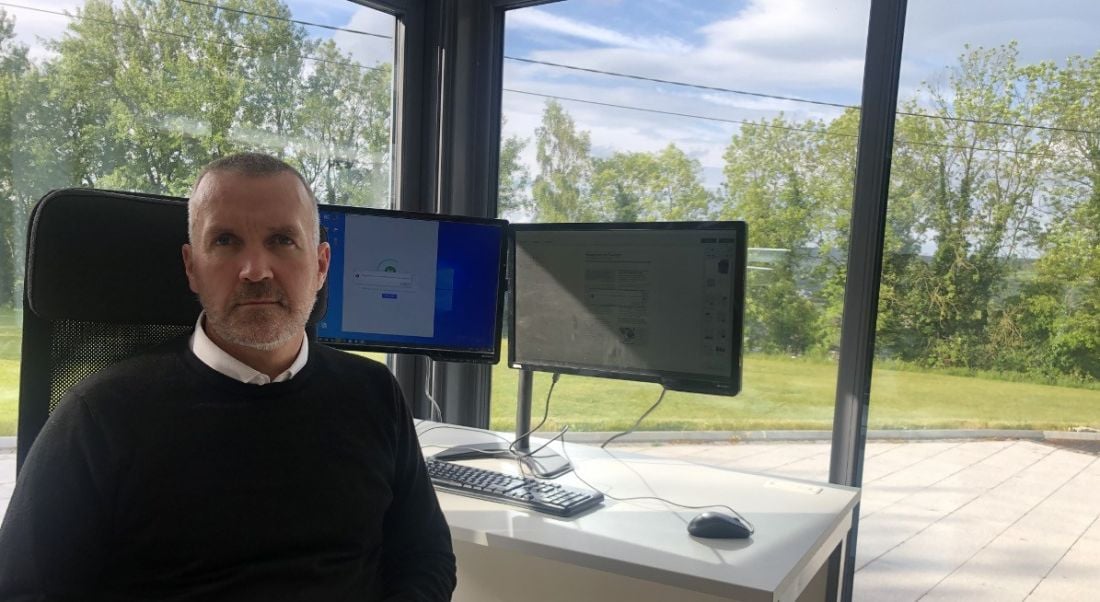Digital publishing company 3D Issue recently transitioned to a four-day work week. Here, CEO and founder Paul McNulty explains how his team made the move.
With recent disruptions from Covid-19, it’s hard to remember a time when our conversations about the future of business didn’t revolve around working remotely or from home. But one possibility some companies had been discussing before the pandemic began was shifting to a four-day week.
At Donegal-based digital publishing company 3D Issue, employees had recently transitioned to working four days a week when remote work became a requirement for most of us across the country.
To learn more about 3D Issue’s decision to take this leap, I spoke to its CEO and founder, Paul McNulty. He led the company’s 15 full-time employees through the change, while ensuring the demands of its 6,000 customers were still met.
‘Employers tend to default to money as a reward but, for many people, it’s not a primary driver’
– PAUL MCNULTY
Why did 3D Issue switch to a four-day working week?
For the last two years, we’ve been building our soon-to-be-launched platform, Experios. The entire team went the extra mile to deliver it. I wanted to do something to reward that effort. And my auto-response has always been ‘pay rise’.
But this time, I decided to offer everyone a choice: either a 20pc pay increase or a four-day week. Every single person chose a four-day week.
I’d already read great things about the increased productivity that comes from a shorter working week. But making the shift felt like a way to increase the overall happiness of the existing team while making the company more appealing to future recruits, too.
What kind of preparation did you have to do in order to make it a reality? Were there test runs?
We didn’t test-run the change, as such. In fact, once we’d had the conversation, it was impossible to put the genie back in the bottle!
Our primary concern was to ensure sufficient cover for each role and function. And the logistics of that were a bit of a juggle. But we now have a Monday group and a Tuesday group. The former always have Fridays off, the latter always have Mondays off.
Why was it important to you to check with employees whether they’d prefer a pay rise or a shorter working week?
Most of the team have been with us a long time. We speak openly about all facets of the business. I had an inkling about which option they’d go for, but I didn’t want to make the decision for them. An extra day to spend on yourself or with your family, or a pay rise that’s likely to be impacted by tax – it’s a no-brainer, really.
And from a company perspective, we can take the surplus cash that was set aside for the universal pay rise that didn’t happen and repurpose it. We’re actively recruiting at the moment to bring new ideas and energy into the company. It’s a win-win for all of us.
Has your new style of work been disrupted by Covid-19?
Our decision was made prior to the Covid-19 pandemic and as the full impact of it began to sink in, everything was pushed back for a few weeks. We needed to get the entire team set up, and quickly, for full-time remote working.
Like everyone else, our market was also affected. We offer our software as both online and desktop solutions. Because of the pandemic, we were inundated with inquiries from customers needing assistance to move desktop or intranet licences to the cloud or to transfer licences to new machines.
We launched a service for schools, too, so they could use our software free of charge during the pandemic. And this brought in a surge of new users that needed assistance onboarding. The team – especially in sales and support roles – went above and beyond to help customers adjust to their new working environments.
What have been the biggest lessons you’ve learned in adjusting to a shorter working week?
Making the change to a four-day working week has made me think more creatively about the measures I’ll take in the future to boost employee happiness and reward metrics.
Employers tend to default to money as a reward but, for many people, it’s not a primary driver. Entrusting employees with responsibilities that reflect their abilities and personal goals, for example, is key.
Happiness is made up of so many different components. We already do small things here, like giving people their birthday off. But the value of employee happiness on the overall working environment cannot be overstated. Having said that, a three-day week is definitely off the table!
What were the biggest challenges?
On reflection, the allocation of employee holidays was something we should have planned out better. Making the shift part-way through the year made things a bit messy. So, we asked staff to take a few days off – before the move – to help with the transition.
It’s important to ensure there’ll be sufficient cover in place for all roles and to have a clear vision about how to manage holidays, including bank holidays. These things matter.
How the world has changed since this article was published, such a short time ago.?Would love to hear how you're adjusting to "the new normal"… ?
(Thanks again, @adrianweckler!) https://t.co/sBCvOOAc5O
— 3D Issue (@3Dissue) May 8, 2020
What advice would you give other companies considering such a change?
When it comes to more flexible working arrangements like shorter weeks and remote working, the advice I’d give to other companies is: get prepared, it’s coming. I think it will become the new norm in the tech industry within 24 months.
How staff view their work today is completely different to how they viewed it in January. Firms have noticed this. Twitter’s announcement, for example, that their employees can now work from home permanently is just the first step. More companies will follow and more changes will occur over the coming months and years.
Covid-19 has had a profound effect on how people assess their life’s priorities and how they achieve balance. I think the pandemic will accelerate a systematic and broad-reaching change in work behaviour. People still want to do a great job and meet business goals, but their working experience will need to more closely align with their personal values.
And we, as employers, should see this as an opportunity. A good work-life balance for employees will lead to greater satisfaction, commitment and loyalty. When it comes to recruiting, if the flexibility is there, you’ll see an increase in the quantity – and quality – of applicants.
We’re currently recruiting for developers and have noticed a five-fold increase in the applications we’d typically receive. All applicants have mentioned our four-day work week as a contributing factor in applying for the position.
All that we are, at 3D Issue, is early. Over the coming months, I think all companies will need to start thinking more flexibly when recruiting for new talent. It will become a competing factor in tech recruitment. And, from there, it will ripple out to other sectors.




